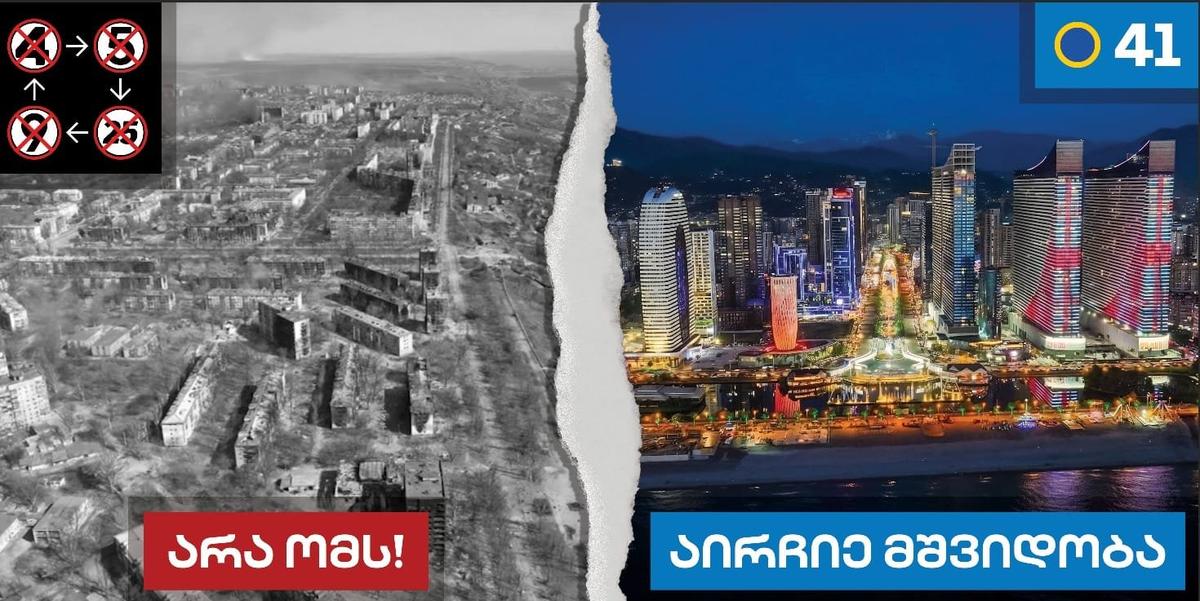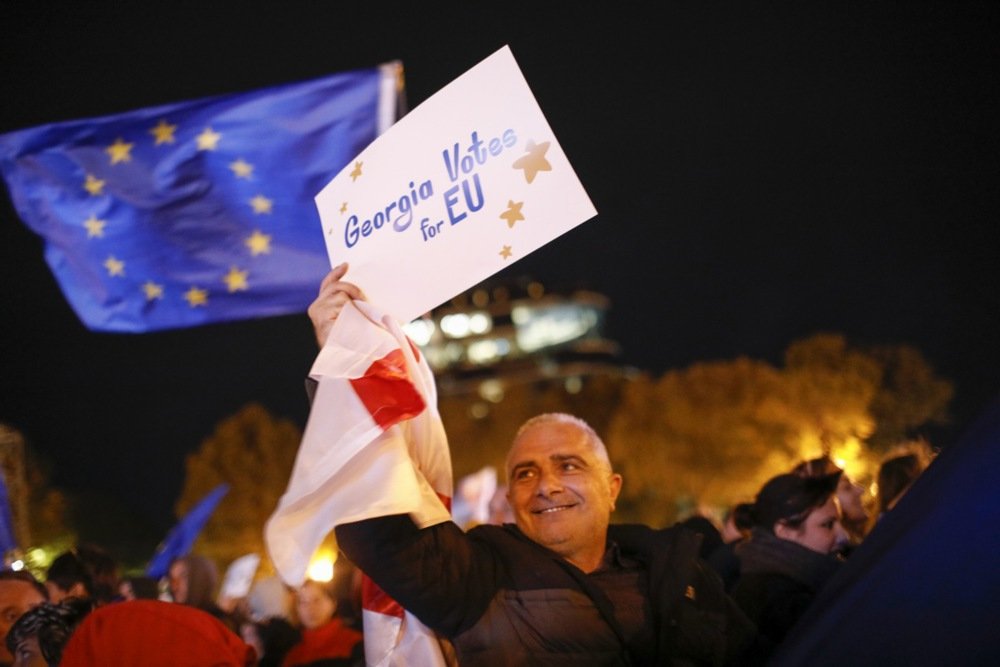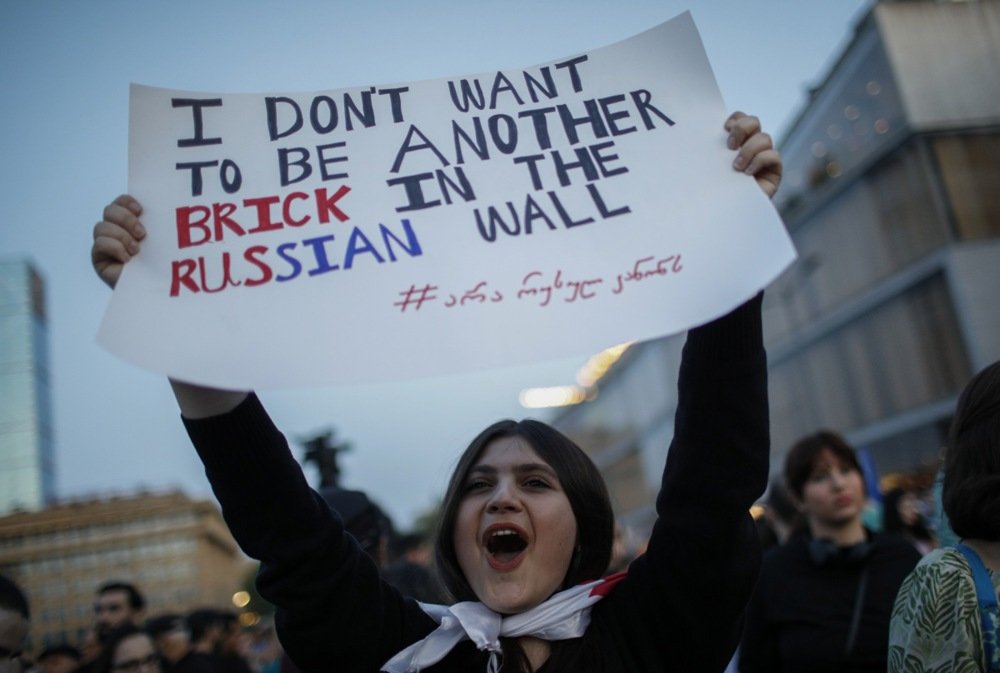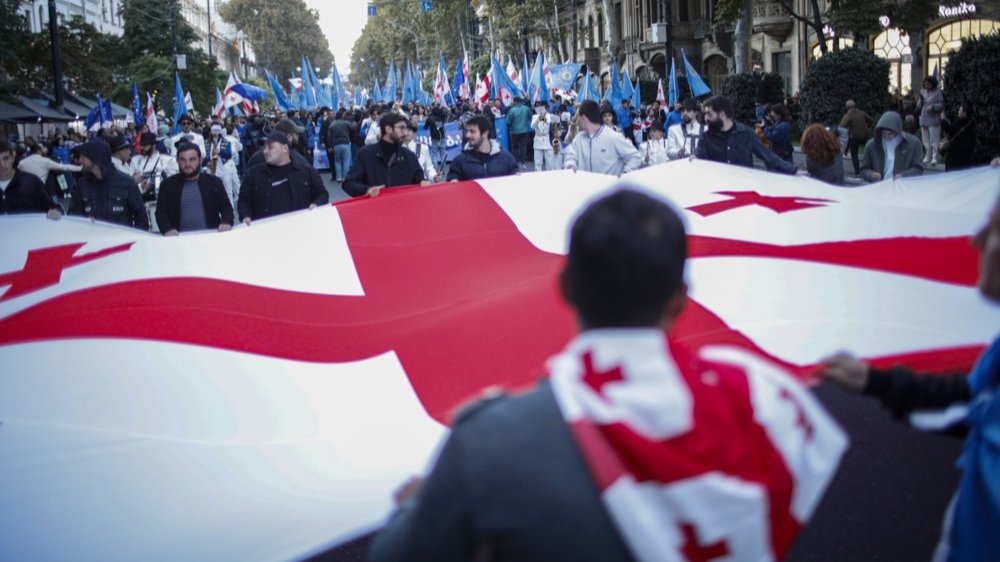Georgia will hold crucial parliamentary elections on 26 October, widely seen as a referendum on the country’s future, bringing it closer either to Europe or Russia. In the run-up to election day, Novaya Gazeta Europe has uncovered reports of electoral interference by the ruling Georgian Dream party, raising doubts about the fairness of the country's political landscape.
Elections are invariably tense affairs, with opposing sides pitted against each other in a way that can often feel existential. That’s certainly the case in Georgia, as citizens of the South Caucasus nation prepare to vote on Saturday in what many consider the most significant election since the country gained independence from the Soviet Union in 1991.
For the ruling Georgian Dream party the election has been framed as a Tolstoyan decision between war and peace. The opposition, they say, are seeking to open up a “second front” against Russia in context of the war in Ukraine, and only Georgian Dream can guarantee peace. Billboards dotted across the country show black-and-white images of bombed-out Ukrainian cities juxtaposed with colourful images of a peaceful, sunlit Georgia. “Say no to war — choose peace”, the campaign poster reads.
The opposition sees the choice being between two possible futures for Georgia: a flourishing, democratic one in which the country eventually joins the European Union, and one in which Georgia realigns itself with Moscow as it slides further and further into authoritarianism, a path they argue is being pursued by Georgian Dream.

“Say no to war — choose peace”. Screenshot from a Georgian Dream campaign ad. info9 / Facebook
Georgian Dream’s founder Bidzina Ivanishvili, a billionaire who made his fortune in Moscow during the chaotic privatisation era of the 1990s, has spearheaded a series of illiberal policies, including the passing of a controversial “foreign agents” law in May, which critics call the “Russian law” for its resemblance to the Kremlin’s use of foreign agent legislation to silence dissent. Following that came a law in September combating “LGBT propaganda” and reinforcing “family values”, mirroring the Kremlin’s own push to preserve conservative social norms.
Many journalists, opposition figures and civil society representatives have been threatened or physically assaulted since tens of thousands of Georgians came out onto the streets in the spring to protest the laws.
In a not-so-subtle tilting of the political playing field, Georgia’s ruling party recently promised to ban virtually all opposition parties if they win the election, promising “Nuremberg trials” for the United National Movement (UNM), Georgian Dream’s current main rival for power.
There were jubilant scenes on the streets of Tbilisi in December 2023 when Georgia celebrated receiving EU candidate status, but the bloc has since stalled the accession process due to the government’s overt anti-Western turn.

Georgians rally in Tbilisi in support of EU membership ahead of the parliamentary elections. Photo: EPA-EFE/DAVID MDZINARISHVILI
Abuse of state resources
Several election monitoring groups have accused Georgian Dream of misusing state resources to unfairly win the election.
A pre-election report published by Transparency International Georgia, one of the country’s largest anti-corruption organisations, cited cases of voter coercion through threats and intimidation, the illegal collection of personal data, the confiscation of ID cards, and the misuse of budget programmes for narrow partisan purposes, among other “corrupt practices”. The report concluded that “the line between the ruling party and the state has effectively been erased”.
The International Society for Fair Elections and Democracy (ISFED), an organisation that has monitored elections in Georgia since 1995, found that from 27 August to 30 September, 60 complaints surrounding alleged violations of electoral law were submitted to the Central Election Commission (CEC), with seven complaints and four lawsuits submitted by monitoring organisations.
“The abuse of administrative resources so far, the amount of vote buying and the amount of violence we’ve witnessed this year, makes it hard to say that there has been a free and fair electoral environment in the campaign period,” said polling analyst Dustin Gilbreath of the Caucasus Research Resource Center, a Georgia-based think tank.
“The line between the ruling party and the state has effectively been erased.”
In a video recorded by an election monitor and sent to Novaya Gazeta Europe, an elderly woman from the village of Oktomberi in Georgia’s western Samegrelo region recounts being asked by a local official with alleged ties to Bidzina Ivanishvili to hand over her ID and those of her two sons, one of whom is disabled. She says in the video that she was offered 1,000 Georgian Lari (€338) and a promise to renovate one of the rooms of her house in exchange for handing over their three IDs, though she refused both offers.
The woman noted that this was not the first time that Georgian Dream representatives had requested her ID, that they had done so in previous elections as well. “I’m in financial hardship, and all this time I have never received any help from the government for my disabled son, but as long as I’m alive I’m not going to sell my vote,” she said.
Pressuring public officials
Georgia’s public sector workers, who account for a sizeable 22% of the population, can be more easily subjected to political pressure than most citizens given that they are on the government’s payroll.
Earlier this month, Georgian public broadcaster Pirveli aired a story revealing that civil servants were being coerced into providing personal and family members’ data to Georgian Dream to ensure their votes. According to the programme, civil servants were asked to submit information such as their names, surnames, ID numbers, addresses, and registered polling stations, and were even pressured to disclose in advance who they intended to vote for in the upcoming election.

Bidzina Ivanishvili, founder of Georgian Dream, addresses a pre-election rally in Tbilisi on Wednesday. Photo: EPA-EFE/DAVID MDZINARISHVILI
“The kind of information that they [Georgian Dream] process, personal information from various government institutions, cannot be done without this being a systemic approach and without the decision to have this strategy essentially being taken on the highest decision-making level,” said Sandro Kevkhishvili, head of Transparency International Georgia’s anti-corruption programme.
Speaking to Novaya Gazeta Europe on the condition of anonymity, one employee at the Ministry of Internal Affairs said that he was asked by his boss for a list of his family members. After he provided that list his superiors found out that his brother was affiliated with UNM, and pressured him to hand over the IDs of all his family members. Those on the list established as supporters of Georgian Dream were able to keep their IDs, while the IDs of opposition voters would be taken away, the source said. His boss threatened to fire him if he didn’t comply. He refused.
“I’d rather lose this job than live in slavery,” he said. The source has been working for the special task force since the Shevardnadze administration, which ended in 2003, and says he doesn’t remember facing such pressure even back then, a period in Georgian history marked by rampant corruption.
“Before all this happened I was going to stay apolitical and not vote, but after such huge disrespect I will definitely vote, but for the opposition,” the public official said.

An opposition rally in Tbilisi protesting against the “foreign agent” bill in April. Photo: EPA-EFE/DAVID MDZINARISHVILI
Simple but effective
Methods of electoral tampering can at times be more crude. The ruling party’s hand is reportedly involved in efforts to block a group of Georgian citizens in the country’s Russian-occupied Abkhazia region from physically accessing a local polling station.
In 1992-1993 a war between Georgia and Abkhazia displaced some 250,000 Georgian civilians. According to the latest figures Georgians still make up an estimated 17% of Abkhazia’s population.
Residents of the Gali district in particular, which straddles the border line with Georgia, have historically been deprived of basic human rights, including the right to political participation, to land ownership, and to access to education in their native languages.
“Before all this happened I was going to stay apolitical and not vote, but after such huge disrespect I will definitely vote, but for the opposition.”
Levan Mebonia, the director of the Enguri Hydro Power Plant in Gali — Georgia’s largest electricity producer — is alleged to have told a group of employees not to vote in the elections after being instructed to do so by Georgian Dream associates, according to testimony from an employee at the plant. The Enguri Plant administration has categorically denied the claims.
When those associates got wind of reports that the plants’ employees would not comply with such orders, they reportedly negotiated with Russian authorities in Abkhazia to close the local bridge during the election period.
The bridge is the only way that Georgian citizens in Abkhazia can get to the polling station in Tbilisi-controlled territory. On Friday Abkhazian authorities officially announced they would close the Enguri bridge from 23-30 October, citing “possible provocations from radical forces”.
Russia’s support for Georgian Dream
Russian officials have expectedly praised the Georgian government for the very policies that have alienated Georgia from its Western partners, such as the “foreign agents” law and its wide-ranging anti-LGBT legislation.
Since the Russian invasion of Ukraine, Georgian Dream has pursued a policy of pragmatism towards Russia, refusing to join the West’s sanctions regime against its northern neighbour. In return, Russia has restored direct flights with Georgia and abolished visa requirements for Georgians.
One of the ruling party’s key campaign promises if it wins the elections has been to “apologise” to Ossetians for the country’s 2008 war with Russia, which led to Moscow recognising the two separatist territories of Abkhazia and South Ossetia as independent. To this day Russian forces are stationed in both breakaway regions, which Georgians consider to be an occupation of 20% of their country.
The high stakes of this election have raised the possibility that Russia could intervene militarily to keep Georgian Dream in power. In July, Andrey Klimov, the Deputy Chairman of Russia’s Federation Council, implied at a meeting in Moscow that Russia would be prepared to help Georgian Dream retain power if requested, drawing a parallel with Russia’s military intervention in Syria, which according to Klimov “stabilised” the country.
The high stakes of this election have raised the possibility that Russia could intervene militarily to keep Georgian Dream in power.
However, Kremlin spokesperson Dmitry Peskov recently rebuffed the notion that Russia might interfere in the Georgian elections to ensure an outcome favourable to Russia’s interests.
“It is none of our business. We see blatant attempts by Western countries to put pressure on the current Georgian authorities and to exert direct, undisguised influence on the course of the election campaign,” Peskov said, adding “we do not and will not interfere in Georgia’s internal affairs in any way.”
Yet despite these assurances, an investigation published by Bloomberg on Monday revealed that between 2017 and 2020, Russian spies had hacked almost all Georgian government agencies — including the Central Election Commission — along with major companies, oil terminals, and media platforms.
The elections that brought Georgian Dream to power in October 2012 were dubbed at the time as the first peaceful transition of power in Georgia’s history, an essential milestone for the country’s democracy. Now the same party that benefited from such progress could become the architect of its downfall.
Join us in rebuilding Novaya Gazeta Europe
The Russian government has banned independent media. We were forced to leave our country in order to keep doing our job, telling our readers about what is going on Russia, Ukraine and Europe.
We will continue fighting against warfare and dictatorship. We believe that freedom of speech is the most efficient antidote against tyranny. Support us financially to help us fight for peace and freedom.
By clicking the Support button, you agree to the processing of your personal data.
To cancel a regular donation, please write to [email protected]

